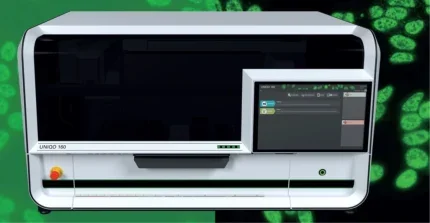
IFA is a core technique in autoimmune diagnostics, providing highly sensitive, specific and broad screening of autoantibodies in many different diseases. Automation solutions enable laboratories to boost the efficiency and standardisation of the analyses. This is particularly critical for laboratories struggling with a lack of qualified staff, especially for the timeconsuming and difficult microscopic evaluation. The all-in-one UNIQO 160 device from EUROIMMUN automates the entire IFA process from sample entry to softwarebased result proposal, thus maximising the efficiency and standardisation of IFA and saving valuable staff time.
IFA processing
The UNIQO 160 performs all steps of IFA analysis, encompassing sample preparation, incubation, washing and mounting of slides, acquisition of images and evaluation of results. It has a processing capacity of 160 samples per run and is ideal for laboratories with medium sample throughput looking for a high degree of automation. The system offers flexible loading of up to 20 controls, four dilution buffers, nine bottles of conjugate and mounting medium. Integrated barcode scanners identify samples, reagents and slides during the entire process, ensuring quick loading, correct assignment and complete traceability. The integrated threeneedle system provides efficient pipetting of samples, reagents and mounting medium. The UNIQO 160 boasts an integrated highquality microscope unit with an automatic focus and three automatically changing objectives (4x, 10x, 20x), ensuring acquisition of brilliant fluorescence images.
AI-based evaluation
Result proposals are generated using the using the EUROPattern Classifier software, which uses deep convolutional neural networks to reliably differentiate positive and negative results, classify fluorescence patterns and generate tighter suggestions.
Among the core applications of the Classifier is the evaluation of anti-nuclear autoantibodies (ANA) on human epithelial (HEp-2) cells to support diagnosis of autoimmune rheumatic diseases. The classification software recognises nine fluorescence patterns according to the International Consensus on Antinuclear Antibody Patterns (ICAP), as well as any combination thereof. The Classifier also includes evaluation of anti-neutrophil granulocyte antibodies (ANCA), which are markers for autoimmune vasculitides and chronic inflammatory bowel diseases. The software distinguishes the main patterns of cytoplasmic, perinuclear and atypical ANCA on granulocyte substrates, while an additional substrate of HEp-2 cells coated with granulocytes enables immediate exclusion of ANA interference.
Further cell-based applications of the Classifier include evaluation of anti-dsDNA antibodies on Crithidia luciliae and evaluation of transfected-cell substrates. The latter are used for monospecific detection of diagnostically critical markers in primary membranous nephropathy.
New tissue substrates
Recently, the AI-based evaluation has been extended to fluorescence patterns on tissue substrates. These are generally more challenging to evaluate due to their complex structures. The Classifier includes evaluation of fluorescence patterns on the substrates rat liver, kidney and stomach to detect autoantibodies associated with autoimmune liver diseases. It also identifies autoantibodies against endomysium (class IgA, EmA) on liver or oesophagus to support diagnosis of coeliac disease.
The EUROPattern Classifier is connected to the EUROLabOffice 4.0 management software, which provides complete and fully traceable administration of patient data, analyses and results. Continuous bidirectional communication with the LIS ensures secure, traceable and rapid data exchange for a streamlined laboratory routine. Further evaluation applications with the Classifier will be available soon.





